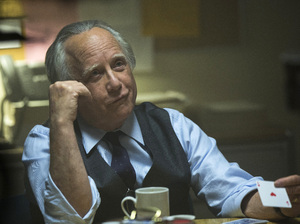
Richard Dreyfuss stars as Bernie Madoff.
Breaking the fourth wall is like putting gold leaf on a dessert: good for a quick jolt of surprise and superficial specialness, but the more common it becomes in the culture, the less impressive its deployment by any particular creator.
We are in a fourth-wall-breaking moment, particularly in matters of elite corruption. House Of Cards has relied heavily on Frank Underwood (Kevin Spacey) addressing the camera, The Big Short has characters (particularly Ryan Gosling's character, Jared Vennett) and interstitial narrators turning directly to the audience to explain complicated financial concepts, and now, ABC's miniseries Madoff has Richard Dreyfuss gazing right into the lens as well.
Madoff, which will air as two two-hour blocks on Wednesday and Thursday nights, presents Bernie Madoff as a man with a brazen scheme to fleece rich people and charitable foundations by simply taking their money and never investing it — instead, he just kept and spent it, after distributing some to previous "investors" as imaginary profits.
Madoff is making all this money in the run-up to the 2008 financial crisis — while the protagonists of The Big Short are waiting to make theirs. In Adam McKay's Oscar-nominated film about the men who correctly bet against the housing market, the challenge is getting people to understand an incredibly complex set of financial structures that could be manipulated by people who knew how. In Madoff, though, the challenge is getting people to understand how very simple Madoff's approach really was. There comes a depressing point where you realize that he has, in fact, explained what he did, and you just may not have caught it, because films like The Big Short have prepared you for something more complicated. McKay's guys navigated a system so confusing most people didn't understand it even as they made (or lost) money in it. Madoff cashed checks that were handed over to him voluntarily. But they're both, in different ways, efforts to explain the same moment when shocking levels of instability became evident.
It's hard to make a good movie about something like the financial crisis, because storytelling is best at its most specific, and the behaviors that precipitate systemic dysfunction are often diffuse, spread out over many, many people, none of whom believe that they, individually, are doing anything all that bad. It's not unlike trying to create a dramatic narrative about what causes racism or climate change: you can examine the history and you can choose representative stories, but you can't actually explain all the forces that got you in such trouble through one well-told tale.
Dreyfuss, as Madoff, is playing one of the few people who can — as the character himself acknowledges — be legitimately singled out as a bad guy. But in part because he looks at the camera, he's also your guide to his own story: he conspiratorially meets your eye and tells you directly what he did.
So: Frank Underwood, The Big Short's Jared Vennett, Bernie Madoff ... all fourth-wall-breakers. All men whose task it is to help you understand a structural problem through the lens of an individual wrongdoer. And it wasn't until I read this piece by Tom Bond that I remembered that, of course, The Wolf Of Wall Street had a con man who loved gazing into the camera — as did Ferris Bueller's Day Off. So what is it with con men, or at least operators?
Bond argues that in The Big Short, at least, the function of the fourth-wall-breaking is both to educate from a position of authority and power (Ferris being the same) and ultimately to indict the audience — to bring them in on the distribution of blame.
In Madoff, though, it seems to serve a slightly different function: it stresses the personal nature of the story, which is what gives it meaning. Without Dreyfuss' powerful central performance, there's surprisingly little to the story of Madoff if you talk about him rather than about the people whose money he took. By his own description late in the film, even from prison Dreyfuss' Madoff regrets little other than the effect of his crimes on his own family. The families of others, the foundations, the people he worked with from whom he demanded loyalty who wound up ensnared in the scandal? He spares them no thought at all. If there is an arc in the film's telling of Madoff's story, it is simply that of a man more bold than he is inventive, who simply does something, learns it works, and keeps doing it as hard as he can until he learns it's over, at which point he effectively shrugs and retires to prison.
While looking at the camera does, as Bond says, suggest authority and control, it also, in a simpler way, creates intimacy. As Madoff's victims — not only his "investors," but the members of his family and staff who are implicated and imperiled — accumulate, he seems to feel nothing, which would probably be difficult to convey without him looking directly at you and telling you so. It's his affect, or his lack thereof (Dreyfuss recently acknowledged to Robert Siegel on All Things Considered that he considers Madoff a sociopath), that makes him compelling. The film is otherwise unremarkable, really, but because Dreyfuss is given an exceptional tool with which to pound the sincerity of his remorselessness, it elevates what could be facile villainy to something more indelible.
9(MDE1MTIxMDg0MDE0MDQ3NTY3MzkzMzY1NA001))
300x250 Ad
300x250 Ad
